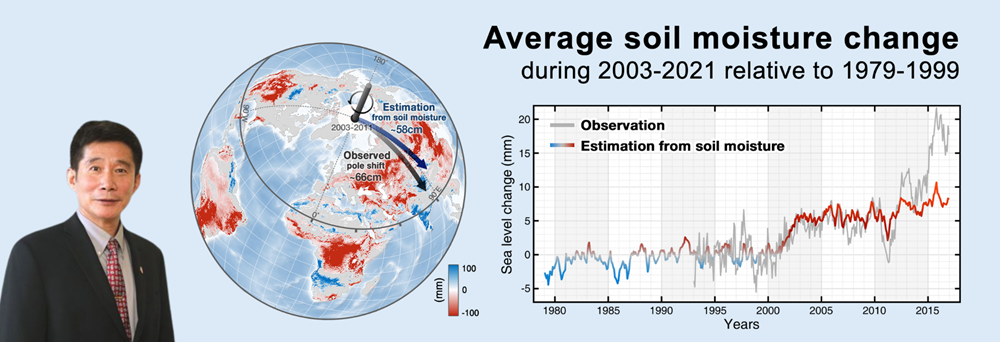In a groundbreaking study, Prof. CHEN Jianli, Core Member of the Research Institute for Land and Space (RILS) and Professor in the Department of Land Surveying and Geo-informatics, have discovered that 1,614 Gt of water were lost to the oceans between 2000 and 2002. This loss equates to a 4.5 mm rise in sea level. Prof. Chen, along with an international team of researchers, has employed an innovative approach, combining long-term records on global mean sea level (GMSL) and Earth’s polar motion to reveal an alarming hydrological trend: a sharp decline in soil moisture globally.
This dramatic depletion of terrestrial water storage (TWS) is nearly twice as great as the contemporary Greenland ice melting, the largest known contributor to GMSL. Notably, the unprecedented rapid loss of TWS has been followed by a more gradual but continuous depletion, with no signs of recovery. Precipitation deficits and stable evapotranspiration are likely the key factors in this decline. Increasing atmospheric and ocean temperatures have significantly altered terrestrial water circulation and land surface fluxes, such as precipitation and evapotranspiration, potentially causing abrupt shifts in TWS.
Critically, the study has raised questions about the main drivers of declining TWS and whether global lands will continue to become drier. The team’s findings suggest that changing rainfall patterns with increasing interannual variability, coupled with rising evaporative demand driven by higher air temperatures, likely contributed to the decline.
Previous challenges in measuring TWS, particularly groundwater and root zone soil moisture, limited the understanding of hydrological depletion at the continental scale. Accurately capturing soil moisture changes under a shifting climate requires improved land surface and hydrological models. Importantly, this study utilised both GMSL and polar motion data to explore global TWS depletion patterns. It also introduced novel methods for estimating global soil moisture, offering unique opportunities to evaluate and improve modeling at the continental and global scales.
The study, titled “Abrupt sea level rise and Earth’s gradual pole shift reveal permanent hydrological regime changes in the 21st century”, has been published in Science (https://www.science.org/doi/10.1126/science.adq6529).




